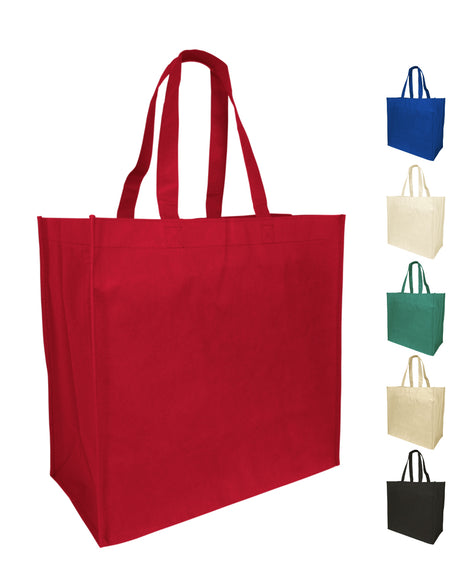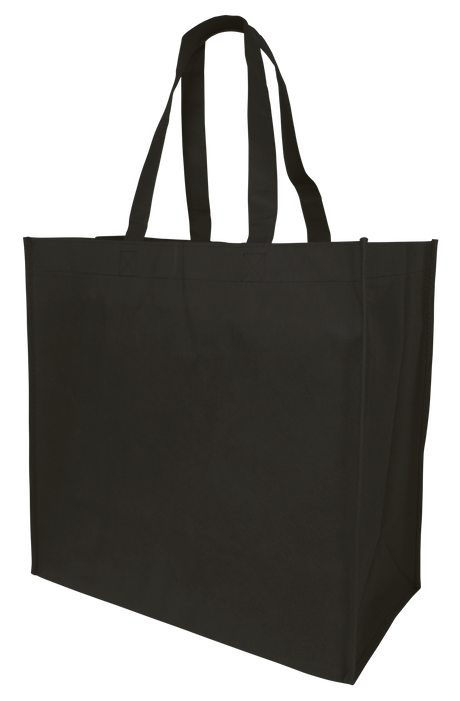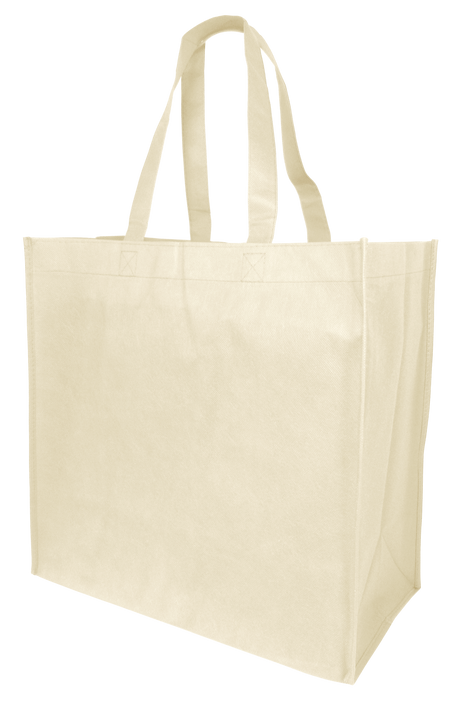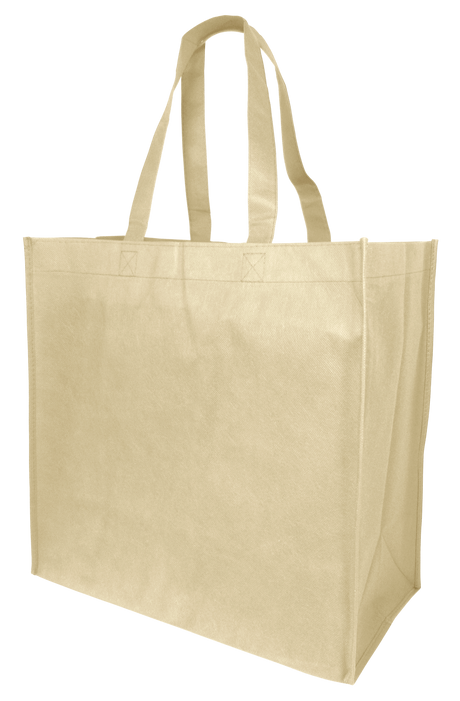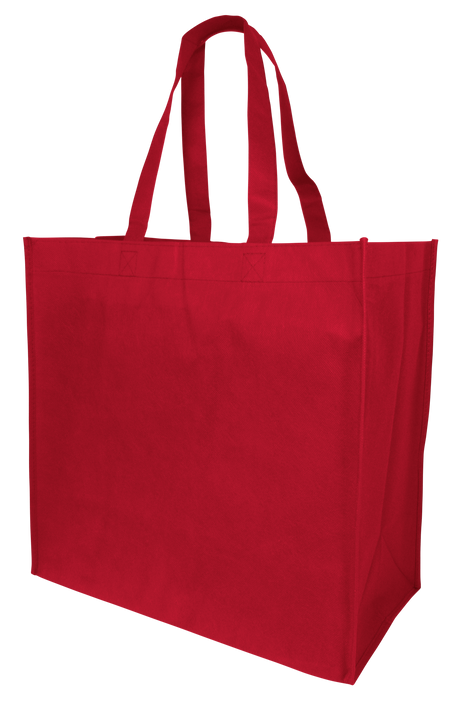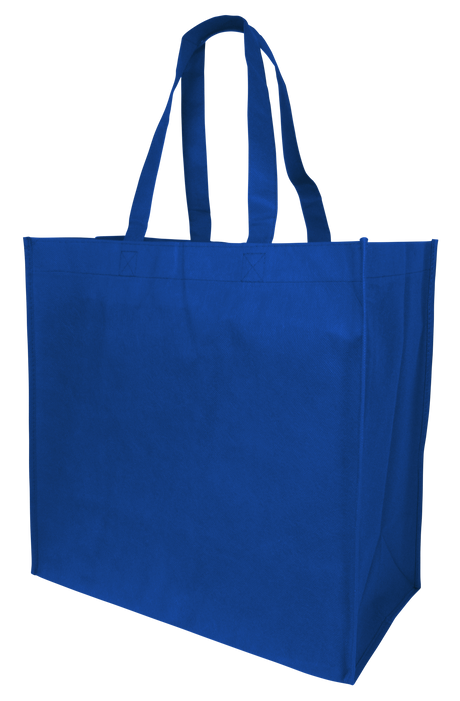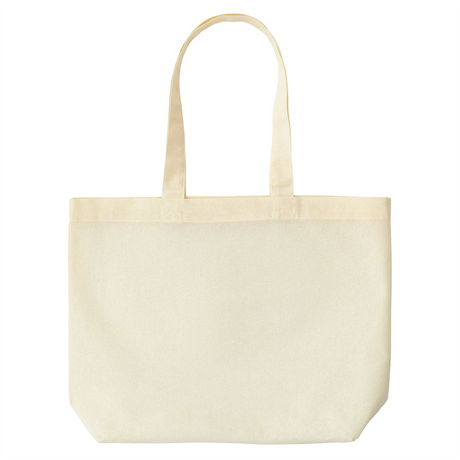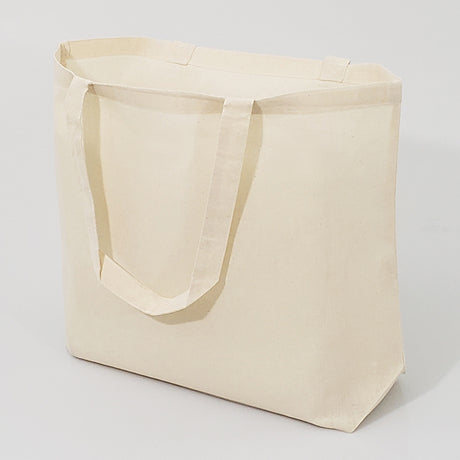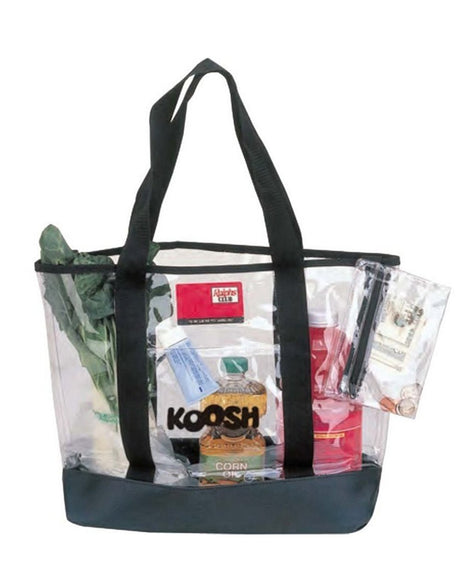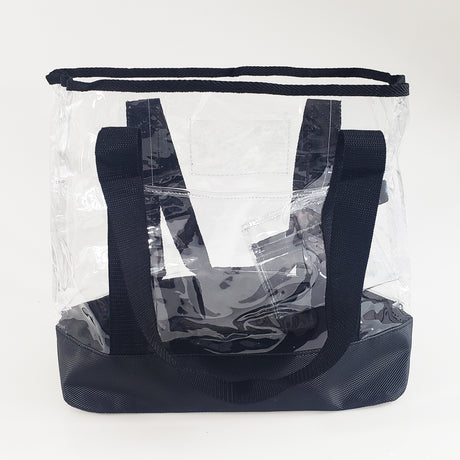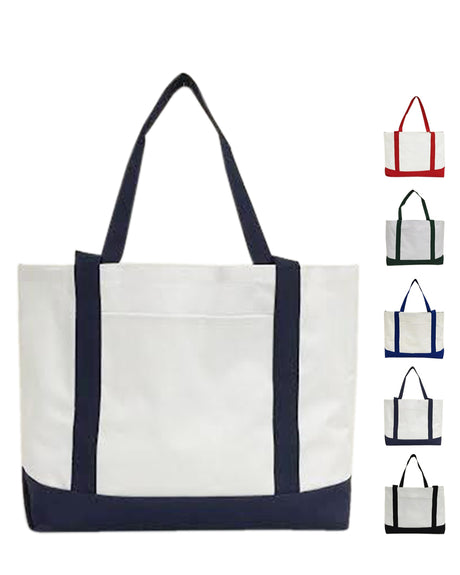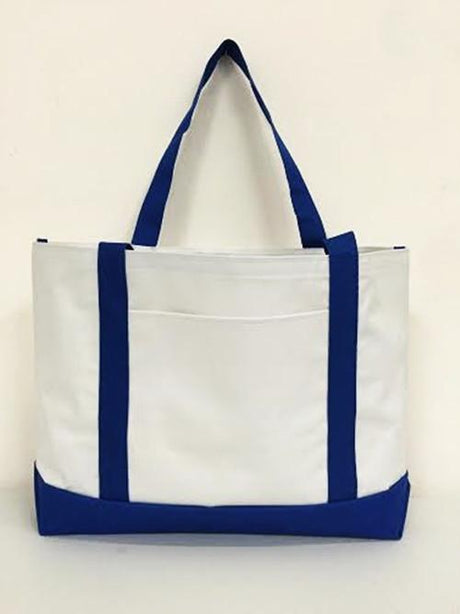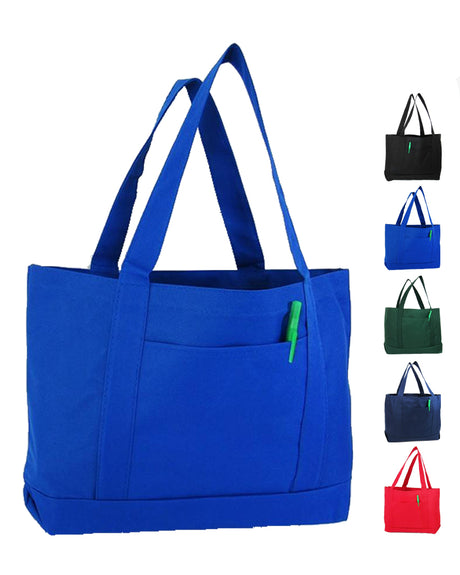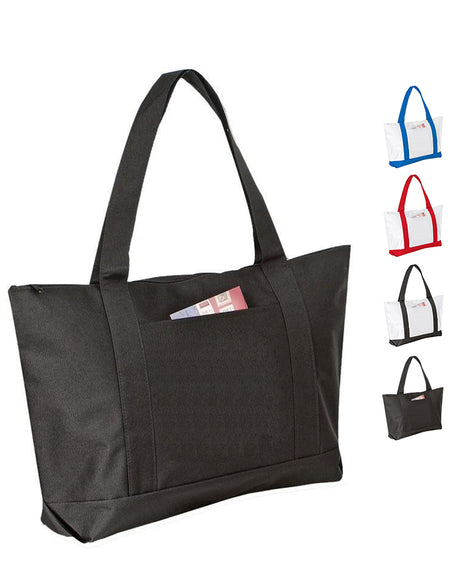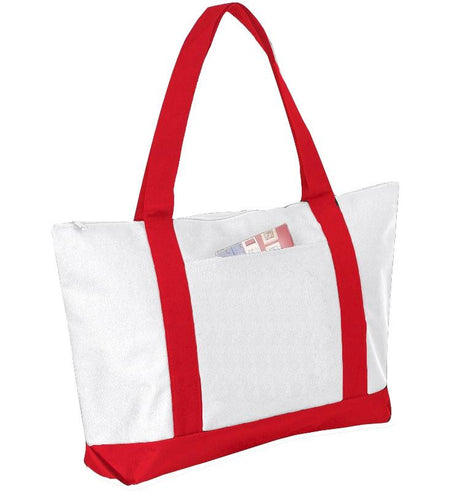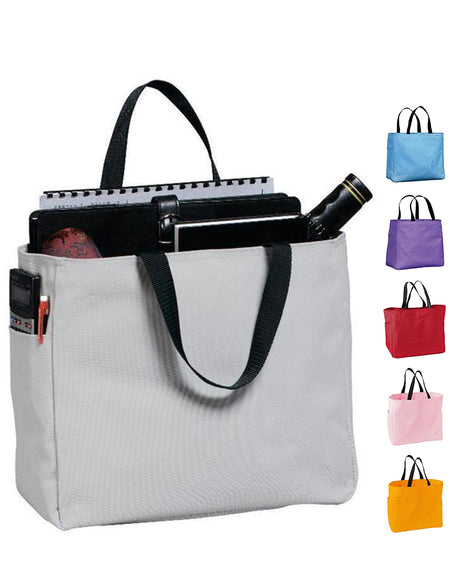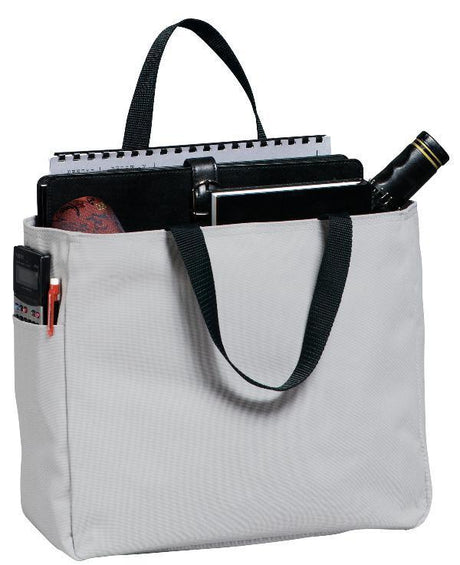How to Order Grocery Tote Bags?
To order Grocery Tote Bags, follow the nine steps listed below.
-
Define the Requirements. Determine the purpose of the grocery tote bags, such as for grocery shopping, promotional use, or multipurpose tasks. Choose the material, selecting options like cotton canvas, polypropylene, or insulated materials depending on the specific needs. Decide the size and capacity based on the intended use, choosing larger bags for groceries or more compact ones for giveaways. Select colors and handle styles, such as reinforced handles for heavy loads.
-
Select a Supplier. Research suppliers online or locally. Compare offerings based on material quality, customization options, and pricing.
-
Request Samples. Get samples to assess material durability, stitching quality, and printing accuracy. Test the features, like handle strength and bag capacity, to ensure they meet the requirements.
-
Plan Customization. Choose a branding method, such as screen printing, embroidery, or sublimation. Finalize the design, including logo, text, or artwork, and confirm its placement with the supplier.
-
Check Minimum Order Quantity (MOQ). Ensure the supplier's MOQ aligns with the needs. Platforms like Tote Bag Factory offer no MOQ for print-on-demand services.
-
Evaluate Pricing and Discounts. Compare pricing across suppliers to get the best deal. Look for additional perks, like free setup, shipping discounts, or loyalty programs.
-
Confirm Production and Delivery Timelines. Ensure the supplier meets the deadlines, especially if the bags are for events or promotions. Verify shipping costs and delivery guarantees.
-
Place the Order. Double-check all details, such as material, size, and customization, before confirming the order. Opt for risk-free guarantees, if available, to ensure quality assurance.
-
Follow Up. Track the order and communicate with the supplier to resolve any issues promptly. Inspect the final product upon arrival to confirm it matches the expectations.
How to Choose Grocery Tote Bags?
To choose Grocery Tote Bags, follow the eight steps listed below.
-
Select the Right Material. Opt for durable and sustainable fabrics like canvas, cotton, or recycled polyester for grocery tote bags. These materials ensure longevity and eco-friendliness.
-
Consider Weight Capacity. Ensure the grocery tote bags support heavy groceries. Look for bags with reinforced seams and sturdy construction for 20 pounds or more.
-
Pick the Appropriate Size. Choose bags that match the shopping needs. Medium-sized bags, around 15 inches wide and 18 inches tall, are ideal for regular groceries, while insulated or smaller bags are best for perishables.
-
Evaluate Handle Strength. Look for reinforced, comfortable straps that evenly distribute weight. Padded handles or handles with extra stitching enhance comfort and durability.
-
Check for Structural Support. Reinforced stitching and bottom panels add stability, preventing sagging under heavy loads. The feature ensures the bag maintains its shape and functionality.
-
Choose a Foldable Design. Compact, collapsible grocery tote bags save storage space and are easy to carry when not in use. They are perfect for daily shopping trips.
-
Look for Multi-Compartment Options. Pockets and dividers improve organization by separating fruits, vegetables, and dairy products. It keeps groceries fresh and prevents damage.
-
Consider Customization. Businesses must select a Customizable Tote Bag for branding or logo printing. It helps enhance brand visibility and fosters customer loyalty.
What to know about Fabric Types of Grocery Tote Bags?
Things to know about fabric types of Grocery Tote Bags are listed below.
-
Canvas Fabric: Canvas is a heavy-duty material made from cotton or a cotton blend. Canvas fabric is strong, tear-resistant, and machine-washable. Heavy groceries, large items, and everyday shopping work best with canvas fabric bags due to their durability and long-lasting performance.
-
Cotton Fabric: Cotton fabric is a soft, biodegradable, and eco-friendly material. It is lightweight, reusable, and easy to clean. Shopping bags made from cotton fabric are ideal for lightweight groceries, errands, or customers looking for sustainable alternatives to plastic bags.
-
Jute Fabric: Jute fabric is a natural fiber with a coarse texture and rustic appearance. It is sturdy, biodegradable, and highly sustainable. Reusable bags with a natural look work best with jute fabric, making them ideal for farmer's markets, organic products, and environmentally friendly brands.
-
Non-Woven Polypropylene (NWPP): Non-woven polypropylene fabric is a synthetic material made from bonded plastic fibers. The fabric is lightweight, water-resistant, and durable. Store-distributed grocery bags and promotional giveaways use Non-Woven Polypropylene because it combines affordability and functionality.
-
Polyester Fabric: Polyester fabric is a synthetic material known for its flexibility and resistance to moisture. The fabric is easy to clean, long-lasting, and maintains its shape well. A reusable grocery bag made from Polyester Fabric withstands frequent use and occasional spills.
-
Nylon Fabric: Nylon fabric is a synthetic material valued for its tear resistance and lightweight properties. The fabric is highly packable and dries quickly. The best nylon fabric for grocery bags is foldable, compact, and easy to carry in a pocket or handbag when not in use.
-
Insulated Fabric: Insulated fabric is a layered material with a thermal lining for temperature control. The fabric helps retain heat or cold, protecting groceries from temperature changes. Bags that carry frozen foods, dairy products, or other perishable items must be made of insulated fabric.
-
Recycled PET (rPET): Recycled PET fabric is made from recycled plastic bottles, promoting sustainability and waste reduction. The fabric is water-resistant, durable, and environmentally responsible. A reusable grocery bag made of recycled PET is a great choice for eco-friendly consumers and brands that want to reduce plastic waste.
Why Insulated Fabric are Best for Grocery?
Insulated fabric is best for grocery shopping because it provides exceptional temperature control, keeping groceries like dairy, frozen foods, and hot meals at ideal temperatures during transport. Insulated bags use advanced materials such as polyester, foam insulation, and aluminum lining to ensure temperature retention and prevent spoilage. The best-insulated grocery bag maintains freshness for extended periods, offering convenience and food safety. Insulated tote bags for grocery shopping feature waterproof or leak-resistant liners, preventing spills from damaging other items in the bag or car.
The insulated fabric's durability and compact design make it an ideal choice for regular grocery shopping. These bags withstand heavy loads and repeated use due to reinforced stitching and sturdy handles. Insulated fabric bags are lightweight and foldable, providing easy storage when not in use. The bags use polyester and expanded polystyrene (EPS) foam to provide superior insulation. Using insulated fabric bags is a sustainable and practical solution for extensive shopping trips or quick trips and maintaining the quality of groceries.
Are Canvas Grocery Tote Bags Durable?
Yes, canvas grocery tote bags are durable. Grocery Canvas tote bags' strength comes from tightly woven cotton canvas, which is resistant to tearing and abrasion, even when carrying heavy items like milk jugs or produce. Canvas bags feature reinforced construction, such as BARTEC seals at the corners, to prevent wear under heavy loads. Durable reusable grocery bags withstand various weather conditions and maintain their sturdiness for years. Beach tote bags, made from similar materials, share these durability traits. They are designed with large capacities to carry large items without sagging, and their heavy-duty fabric resists sand and water damage. A Durable Canvas Tote uses cotton canvas or tough fabrics like twill or denim for added durability and style. These bags are eco-friendly, easy to clean, and offer long-lasting use, making them ideal for shopping and beach trips.
What are the Benefits of Using Tote Bags for Grocery?
The benefits of using tote bags for grocery are listed below.
-
Eco-Friendly and Sustainable: Tote grocery bags reduce plastic waste by minimizing the need for single-use plastic bags and aligning with environmentally conscious shoppers.
-
Durable and Long-Lasting: Strong materials allow grocery tote bags to withstand frequent use without tearing, making them ideal for regular grocery runs.
-
Spacious and High Capacity: Tote bags for grocery shopping are suitable for heavy groceries, fresh produce, and large items, making them great for long shopping trips.
-
Comfortable to Carry: Reinforced handles distribute weight evenly, making it easier to carry groceries without straining the hands or shoulders.
-
Customizable and Stylish: Various colors, designs, and branding options allow for personalization or promotional use.
-
Foldable and Portable: The compact design of Daily Totes ensures easy storage and transport when not in use, making them ideal for travel or daily errands.
-
Easy to Clean and Maintain: Machine-washable or wipe-clean options simplify cleaning and extend the grocery tote bag's lifespan.
-
Multipurpose Use: Grocery tote bags serve more than just grocery needs. Use them for markets, picnics, or daily errands for versatile functionality.
-
Cost-Effective: Eliminating the need for disposable bags provides long-term savings for frequent shoppers.
-
Better Organization: Grocery tote bags come with compartments and pockets to help keep items organized and easily accessible.
How long do Reusable Grocery Tote Bags last?
Reusable grocery tote bags last between 1 and 5 years, depending on the material, use frequency, and maintenance. High-quality reusable grocery totes, such as cotton or canvas, endure 3 to 5 years with proper care, while lower-quality options like non-woven fabric last 1 to 2 years. Follow maintenance tips for optimal longevity, such as washing reusable bags for groceries by hand or on a gentle machine cycle and air drying them to prevent shrinkage. Storing the bags in a dry, well-ventilated area and avoiding overloading them helps preserve their durability. The best reusable grocery bags are made from materials like RPET or cotton. They are used with the proper care hundreds of times, offering a sustainable and reliable shopping solution.
Can Reusable Grocery Shopping Bags be Customized?
Yes, reusable grocery shopping bags can be customized to meet various needs, whether for personal use, branding, or promotional purposes. Customization options include printing logos, slogans, or designs on the front, back, or side panels. Logos are displayed in full color or monochrome. Different materials, such as recycled plastic, cotton, polyester, or jute, are selected, each offering distinct durability and aesthetic appeal. Various color choices are available, with multi-color designs making it possible to have a more vibrant look.
Customization extends to the bag's style and functionality. Tote bags for grocery shopping tailored with different handle types, such as rope handles, cotton web handles, or reinforced straps for added strength and comfort. Reusable bags for groceries feature all-over prints, extra pockets for organization, or interior linings for easy cleaning. Messages that promote sustainability or eco-consciousness are printed to align with environmental values. The practicality and style of Custom Shopping Bags make them a smart choice for businesses looking to make an eco-friendly impact.
How does Tote Bag Factory Provide Wholesale for Grocery Tote Bags?
Tote Bag Factory provides wholesale grocery tote bags made from high-quality, eco-friendly materials like organic cotton, recycled content, and durable fabrics like canvas and burlap. The prominent supplier combines stateside and overseas production to meet different needs. Stateside manufacturing enables fast turnarounds, while overseas production supports bulk orders at a lower cost. Their commitment to sustainability is reflected in the bulk reusable shopping bags designed to reduce reliance on single-use plastics.
Orders placed before 2:00 pm ET are shipped the same day, while orders placed after 2:00 pm ET ship the next business day. Custom orders with logos ship within 7 to 10 business days after proof approval. U.S. orders under $300 incur a flat-rate shipping fee of $14.95, and orders over $300 receive free ground shipping. International customers are responsible for additional customs fees. Tote Bag Factory offers a 30-day return policy for unused items. A Return Merchandise Authorization (RMA) number is required for returns, and items must be returned in their original condition. Personalized items incur restocking fees, while closeout sales and incorrect address returns are final.
Show Less







































